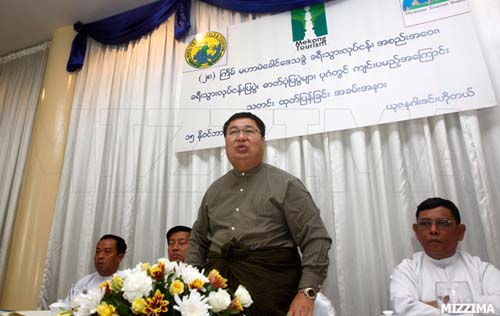New Delhi (Mizzima) – More than 200 Burmese journalists have signed a complaint letter about Myanmar Tourism Board chairman Khin Shwe’s recent criticism that local media was pessimistic and following the ways of foreign media.
 The letter was sent to Union Assembly Speaker Khin Aung Myint.
The letter was sent to Union Assembly Speaker Khin Aung Myint.
On November 15, Khin Shwe made remarks at a press conference claiming the Burmese media displayed a pessimistic attitude similar to foreign media. He made his remarks a short while after a number of journals opposed his idea to transform the historic Ministers’ Office building where Burmese martyrs were assassinated into a hotel.
“He said journalists were seriously lacking in quality. He verbally attacked journalists, so we have to object to his remarks. We need to resolve this,” a prominent journalist, Maung Wun Tha, told Mizzima.
The complaint letter quoted Khin Shwe as saying: “Covering news in a pessimistic way is the way of the foreign media. But, if local media think that they will be successful only if they cover news in a pessimistic way and work the same way as the foreign media, they are wrong.”
Signatures were gathered from 225 editors and reporters; of 39 Rangoon-based journals, nine magazines and other media signed the letter. A CD of Khin Shwe’s remarks accompanied the complaint letter.
Mizzima tried to contact Khin Shwe but without success.
Earlier, Khin Shwe addressed journalists as “gentlemen” and invited them to the Sedona Hotel for a meal and presented them with gift books. Later, he criticized journalists because he said they failed to cover the news properly about the Asean-Japan economic meeting. He said that more than 60 people from Japan and 100 people from Asean attended the economic gathering and the media failed to give it proper coverage.
The complaint letter to the Parliament speaker said it was intended to inform superior authorities about Khin Shwe’s offensive remarks. The letter said they did not want him to be punished, they were performing their role as journalists, and all parties should have mutual respect.
Journalists welcome constructive criticism, but could not accept irresponsible attacks, it said.
“Sources and journalists need to have mutual respect. We will not write only the things that sources want us to write about. If he has such an attitude and if he thinks that by giving us bribes we will do what he wants, that’s wrong, and we need to try to change that attitude,” said Maung Wun Tha, an editor at People’s Era.
On the other hand, one editor said that there are some unethical journalists. “Some journalists do accept bribes,” he said. “They also should be better informed. The media needs to educate the journalists who don’t know about media ethics.”
After the criticism, a group of senior journalists announced that they would hold a three-day workshop on media ethics on December 1 with the cooperation of the Myanmar Journalists Network. The speakers will feature four senior journalists including Ye Naing Moe.


